 'Model husband' shatters image of love
'Model husband' shatters image of love
 Can animals smile? Or put on a happy face
Can animals smile? Or put on a happy face
 Geng Xuan crowned at 9th China Super Model Contest
Geng Xuan crowned at 9th China Super Model Contest
 Top 10 billionaires in the liquor industry
Top 10 billionaires in the liquor industry
 Backstage at China Fashion Week
Backstage at China Fashion Week
 Ballerinas anywhere but onstage
Ballerinas anywhere but onstage
 Top 10 safest airlines in the world
Top 10 safest airlines in the world
 Posters of 33rd HK Film Awards unveiled
Posters of 33rd HK Film Awards unveiled
 Top 10 most popular instant messaging apps in the world
Top 10 most popular instant messaging apps in the world
 Inspiring shadow images of Chinese army
Inspiring shadow images of Chinese army
“I am South African. My culture is completely here in South Africa, I was born and bred in this country,” says Tony Quan, a 78-year-old South African-born Chinese.
“I know everything about this country and I have travelled all over South Africa and Johannesburg. I have been to Meadowlands, Jabavu, Moroka and Phefeni. I know all these back corners of Johannesburg,” he laughs.
While many people his age have retired, the wrinkled old man still works as an assistant in a mini-grocery store in old Chinatown and says he enjoys watching locally produced content on television.
“I like watching local soapies. My favourite soapie at the moment is Isidingo because it is interesting and it keeps me on my toes. Generations on the other hand falls away for me. Every night at 7.30pm I watch Isidingo,” says Quan.
Wits university sociology professor David Dickinson says the way culture is depicted on TV often differs from how culture is practised in everyday lives.
“I couldn’t watch a Chinese show even if I wanted to because I do not speak Mandarin. I only speak English”
Dickinson says the media also influences culture as people sometimes mimic behaviour and language. Cultural practice is not only what parents or family teach their children, but how they are influenced by the media.
Language and culture
Wits student Robert Leong is generations apart from Quan, but both were born and raised in South Africa. Although Quan still speaks Mandarin, he favours locally produced content, as does Leong.
“I couldn’t watch a Chinese show even if I wanted to because I do not speak Mandarin. I only speak English,” says Leong. He studies film and television and says he watches TV when he has time.
“I watch channels that any South African guy my age would watch, channels like SuperSport on DStv.”
Molly Chong, a South African of Chinese descent who is a bookkeeper at a novelty shop in old Chinatown, says the downside of migration is the fact that younger Chinese people do not speak their mother tongue.
“I have two grandsons who can’t speak Mandarin, they only speak English and as a result they only watch programmes in English. It is stupid for younger Chinese to speak only one language, a language that is not even theirs. You have got to know your mother tongue, no matter what nationality you are,” says Chong.
Chong believes watching television shows or movies in one’s mother tongue can help with either learning or continuing to speak the language.
Dickinson says language is one of the most important factors in maintaining and fostering culture. He says it gives members of communities a sense of identity and facilitates communication among races.
“Language has always been a way for people to express ideas and feelings, but the way in which people express their ideas and feelings have changed. Culture is learned and not something people are born with and this is taught through language.”
Filling the gaps through entertainment
David Ye sits cross-legged, his eyes fixed on the television screen as he enjoys a bowl of cold noodle soup. He is watching what seems to be a Chinese singing and talent competition. The room smells like an ashtray.
He owns and manages Heng Ji Sound Systems, right next to Mong Kok, one of the most popular Chinese restaurants on Derrick Avenue in Cyrildene. Heng Ji Sound Systems claims to be the biggest Asian DVD and CD store in Johannesburg – in terms of the number of DVDs and CDs stocked. It is a place where Chinese, Korean and other Asian nationals come to get DVDs and CDs.
Ye moved to South Africa five years ago and lives in Cyrildene with his wife, mother and son. He says, like most Chinese immigrants, he moved to South Africa to seek greener pastures.
“There was an opportunity for me to move to South Africa, to create a better life for me and my family and I took it. I moved here first and my wife joined me over here after I had settled.”
The shop has an assortment of Asian DVDs and CDS, from Mandarin and Cantonese to Korean and Thai, and there is also a wide range of genres to choose from.
For the Chinese diaspora, DVDs and CDs have become a connection to home.
Musa Mash works in a makeshift travel office within the Heng Ji DVD shop.He says the shop is busier than the DVD shop 150 metres from theirs.
“This DVD shop is popular because it has a wide range of DVDs and music not only for the Chinese, but even for Korean and Thai nationals.” Mash says there is a lack of Chinese television in South Africa and DVD shops like Heng Ji Sound Systems add value to the Chinese community and fill a gap for immigrants.
Translator and interpreter Jin Li is a regular customer and says she visits the store often to get DVDs and CDs to keep herself entertained and stay in tune with what is currently on Chinese television. Li strongly believes that watching Chinese programmes helps her remain connected with Chinese culture.
“Watching Mandarin and Cantonese shows reminds me of home, it gives me a sense of relation to my culture as a Chinese expat.”
Dickinson says immigrants like Li may be watching programmes produced in China, because they are produced for the Chinese by the Chinese, whereas content produced in South Africa is for a more diverse group of people.
Li buys DVDs of The Voice, which she says is one of her favourite shows. Heng Ji is the only DVD store where it is available. “Although there are shows similar to The Voice, like Chinese Idols, I feel that winners are chosen purely on their talent and not looks as in the case of Idols.”
“On average I get about 15 Mandarin-speaking customers a day who come to buy or hire DVDs and the most popular discs I sell are those of The Voice and family series which you guys call soapies,” says Ye. “That is what Chinese migrants are watching in Johannesburg. That is what the Chinese come to my store for the most.”
The Voice, a reality talent show, is the most popular television show in China, Hong Kong and Singapore and draws 64 million viewers every week on television and more than 70 million viewers on the internet.
An interactive singing show, it was first broadcast in 2012 as an adaptation of the Dutch programme, The Voice Holland. The finalists of the talent show are chosen by a combination of votes from both the coaches/judges and the audience.
Members of the audience decide on the ultimate winner who in the first season was 22-year-old Liang Bo, a Chinese pop rocker. According to US television and radio network CBS, The Voice is coming under scrutiny by the Chinese government.
“There are plenty of shows that are similar to The Voice and like I said before I really like it, but if it never goes on television anymore, I don’t think it would affect me that much,” says Ye speaking in his personal capacity.
He says he currently has the first season and is waiting for the second season to come out and will have his partners in China ship it to South Africa as soon as possible.“I sell and hire DVDs, but because The Voice is so popular I don’t rent it out, I just sell it.
Ye says Johannesburg is home for him now, but at the same time it is a foreign land and he is part of the minority group. “We watch Chinese series or movies as a means of staying connected with our motherland, that’s what expatriate workers do,” says Ye referring to Li and himself.
“Watching Mandarin and Cantonese shows reminds me of home, it gives me a sense of relation to my culture as a Chinese expat”
Local is lekker wherever you are
Mncedisi Mashigoane, a film and television lecturer at Wits, says local content is appealing to local audiences because it taps into their social realities, either the ones that already exist, or the social realities they aspire to.
“Li and Ye watch Chinese programmes because that is their social reality and that is why programmes like The Voice are appealing to them.”
Not all Chinese expatriates in Johannesburg are watching DVDs and listening to CDs shipped in from the motherland. Some are watching Chinese content on South Africa television. “My grandparents don’t watch the channels my parents and I watch, they watch CCTV-4 [Chinese Central Television 4] on DStv,” Leong says.
This is at present the only Chinese channel in South Africa broadcast by DStv’s MultiChoice. It carries news, documentaries and television series and targets Mandarin and English-speaking viewers 24 hours a day.
Marietjie Groenewald, the head of corporate affairs and communications at MultiChoice, says CCTV-4 is a speciality, niche channel on the DStv platform. The company conducts research on its customers and potential customers on a regular basis and she says there is not sufficient demand for Chinese-only content to warrant a stand-alone package or a Chinese bouquet, as there is for Indians.
“At this stage there are no immediate plans to expand into other Chinese channels and Mandarin speakers only have access to CCTV-4,” Groenewald says.
While MultiChoice’s DStv may have no plans to expand Chinese content, China’s biggest pay-TV operator is expanding across the African continent. Chinese pay-TV operator StarTimes recently acquired a 20% stake of On Digital Media, which runs TopTv.TopTV would not confirm rumours about plans to launch a Chinese channel.
StarTimes is one of the biggest media companies in China, with its main offices in Beijing. The company is reportedly the biggest pay-TV operator in China and it has about 7 million subscribers.
The Chinese pay-TV operator plans to expand its media footprint in Africa and is the fastest-growing digital TV operator in Africa.
The relaunch of TopTV under StarTimes may give Chinese expatriates in South Africa more viewing options and allow them more ways to stay connected with their culture.
The programmes audiences watch are linked to how they either see themselves or wish to see themselves culturally. For some, what they see on TV is reality and for others it is a reality they aspire to.
Please view chinesejoburg.com for more.
 Wonderful moment of China's airborne forces
Wonderful moment of China's airborne forces Bai Baihe shoots for fashion magazine
Bai Baihe shoots for fashion magazine Red terraced fields in Dongchuan of Yunnan
Red terraced fields in Dongchuan of Yunnan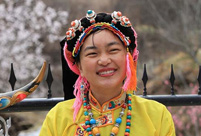 Jiaju Tibetan Village
Jiaju Tibetan Village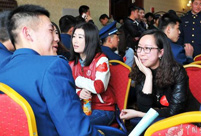 Spring dating
Spring dating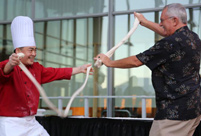 Confucius institute at UC Davis
Confucius institute at UC Davis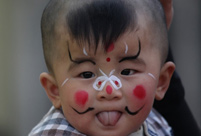 Little painted faces at temple fair
Little painted faces at temple fair Top 10 safest airlines in the world
Top 10 safest airlines in the world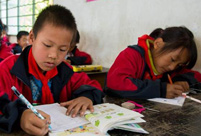 Foreign students at China-Myanmar border
Foreign students at China-Myanmar border The backstage of the Fashion Week
The backstage of the Fashion Week College students in Han costumes
College students in Han costumes Postgraduate works as waitress
Postgraduate works as waitress Life in a Lahu village in Yunnan
Life in a Lahu village in Yunnan An orphan’s wedding
An orphan’s wedding Hollywood documentary brings Diaoyu Islands truth to new audience
Hollywood documentary brings Diaoyu Islands truth to new audienceDay|Week|Month